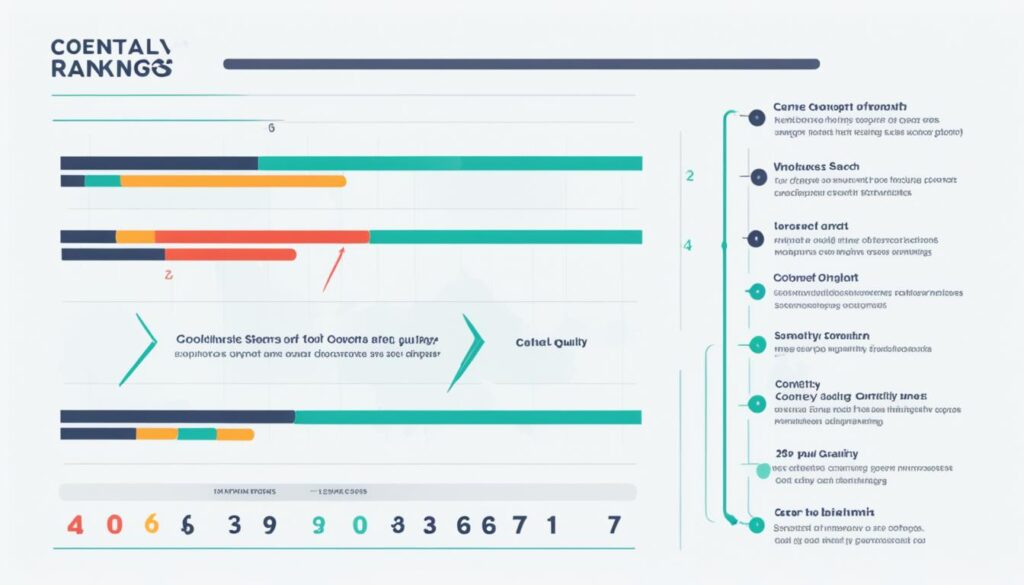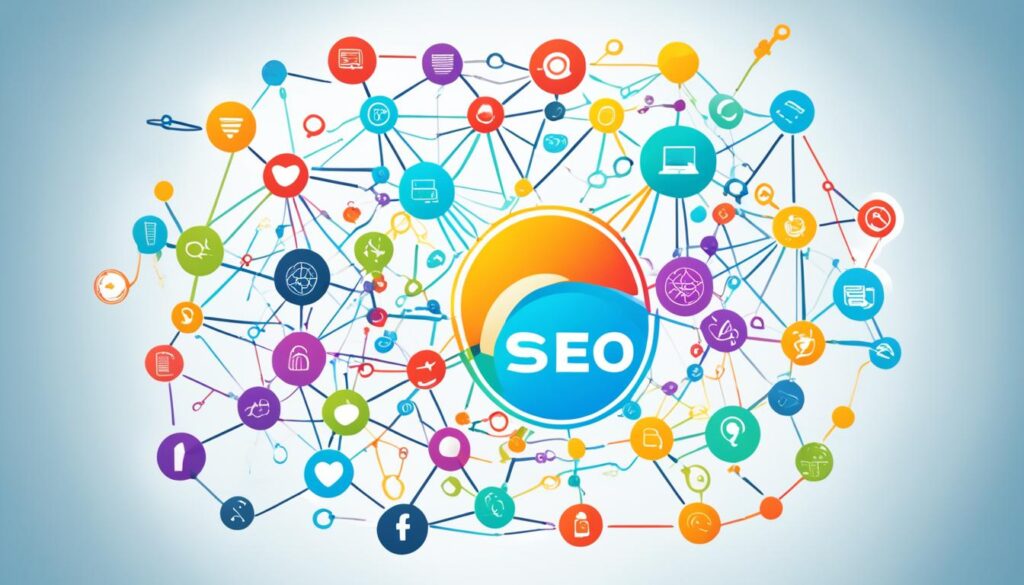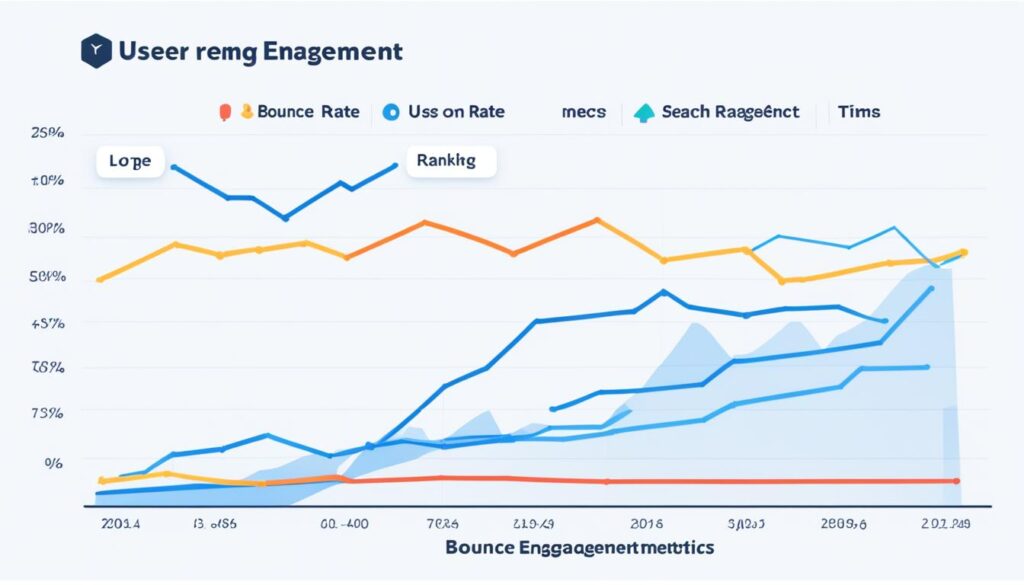Ever wondered why some websites top search results, even if their content is similar? It’s all about reputation signals and their big role in search engine algorithms. Let’s explore this important part of SEO that can greatly affect your online presence.
In the fast-changing world of SEO, reputation signals are key to a website’s ranking. They cover many things search engines look at to see if a site is trustworthy, relevant, and valuable to users. Knowing and using these signals well can boost your SEO and help you stand out online.
Google looks at over 200 factors to rank websites, and reputation signals are a big part of that. These include things like quality content, backlinks, how users experience your site, and mentions of your brand. By focusing on these, you can build a strong online reputation, which means better search rankings and more visibility.
How long people stay on your page, or dwell time, shows if your content is relevant. Search engines see longer times as a sign that users like what they see1. So, making content that keeps visitors interested is key.
Click-through rate (CTR) from search results is another important signal. A high CTR means your content grabs attention and is relevant, which helps your rankings1. This means you should write titles and meta descriptions that make people want to click on your search results.
Social signals like likes, shares, and comments also matter for a website’s authority and relevance1. Adding social sharing buttons and promoting your content on social media can increase these signals. This makes your site look better to search engines.
Key Takeaways
- Reputation signals significantly impact search rankings
- Dwell time and CTR are important indicators of content relevance
- Social signals contribute to a site’s authority and visibility
- User experience metrics play a crucial role in SEO
- Mobile optimization is essential for search rankings
- High-quality backlinks boost credibility and rankings
- Understanding search intent is key to creating relevant content
Understanding Reputation Signals in SEO
Reputation signals are important for search engines to check a website’s trust and authority. They affect how websites are ranked, which changes their visibility in search results. We will look at the main parts that make up a site’s reputation for search engines.
Domain authority, made by Moz, shows a website’s strength and influence. It looks at the domain’s age, content quality, and backlinks. Search engines like Google use similar ideas to see if a site is trustworthy2.
Content quality is key to a site’s reputation. Google uses human quality raters to check content quality2. Good, relevant content that answers user questions can really help a site’s performance3.
User engagement, like time on site and bounce rate, shows how visitors like a website. These signals help search engines see if content is relevant and valuable to users. Brand mentions online, linked or not, add to a site’s overall presence and reputation.
The E-A-T framework (Expertise, Authoritativeness, and Trustworthiness) is key for Google’s algorithm to check a site’s reputation3. This framework looks at the credibility of content creators and the info they share, especially for YMYL topics.
| Reputation Signal | Impact on SEO | Confirmed by Google |
|---|---|---|
| Backlinks | Essential for SEO, considered votes of quality | Yes |
| Content Quality | Affects SERP performance | Yes |
| E-A-T Framework | Evaluates expertise, authoritativeness, and trustworthiness | Yes |
| Core Web Vitals | Confirmed ranking signal since 2021 | Yes |
| Mobile-friendliness | Crucial for mobile search results | Yes |
Knowing about these reputation signals helps website owners and SEO experts improve their online presence and rankings. By focusing on these areas, businesses can build a strong digital reputation that connects with users and search engines.
Key Reputation Factors Influencing Search Rankings
Search engines look at over 200 ranking factors to place websites in search results4. We’ll look at the main signals that affect SEO rankings.
Content quality is the top SEO factor4. Search engines love in-depth content that fully covers topics. This means using the right keywords, LSI terms, and giving full info4.

Backlinks are a big deal for reputation. Sites with lots of high-quality backlinks do better in search results4. These links are like votes of trust from other good sites, making your site more authoritative.
User experience is key for SEO rankings. Things like site speed, being mobile-friendly, and easy to use help with search performance4. Search engines want to show websites that give users a good experience.
Technical SEO stuff, like site structure and how easy it is to crawl, is important for search engines to find and understand your content4. A well-organized site makes it easier for users and search engines to find your pages.
Domain history and age matter for a site’s reputation. Older domains with steady ownership and good histories usually do better in search rankings4.
Local relevance is important, especially for businesses targeting certain areas. Local businesses often see better reputation rankings5.
By focusing on these key factors, we can boost our website’s search rankings and get more organic traffic.
Domain Authority and Its Impact on SEO
Domain authority is key to a website’s SEO success. It ranges from 0 to 100, with higher scores meaning better search engine rankings67. This score comes from factors like domain age, TLD extension, and the quality of links coming to the site.
A new site starts with a domain authority score of one, then grows as it gets more quality links6. The site’s past, including changes in ownership and past penalties, affects its trustworthiness. Search engines pay extra attention to sites with private WhoIs info.

Exact match domains don’t boost SEO much anymore, but they still help with relevance. The TLD and WhoIs details add to a domain’s trustworthiness. Sites with great content tend to have a higher domain authority7.
To raise domain authority, work on getting more and better backlinks, improving user experience, and making unique content7. Remember, domain authority compares sites, so check your competitors’ scores too6.
“The best way to increase Domain Authority is by improving the site’s overall SEO health, focusing on quality and quantity of external links.”
By focusing on these areas, we can increase our domain authority. This helps us rank better in search results, bringing more visitors to our site.
The Role of Backlinks in Building Online Reputation
Backlinks are key to a website’s online reputation and search engine rankings. Google sees backlinks as a major factor in how a page ranks in search results8. Getting backlinks from trusted sources boosts a site’s credibility and visibility.
Backlinks have a big impact on SEO. A single piece of content can get thousands of backlinks from many domains, showing the power of great content9. When big websites like TechCrunch link to your content, you can see a big jump in organic search traffic9.

Link quality and relevance are crucial for a strong backlink profile. Google values links from websites that are related to your content9. It’s also important to have links from different websites, not just the same one9.
What’s in the link also matters. A study showed that using keywords in the link text can help your rankings for those keywords9. But, it’s key to keep your link text natural to avoid Google’s penalties9.
| Backlink Factor | Impact on SEO |
|---|---|
| Link Quality | Higher authority links boost credibility |
| Link Relevance | Topically related links carry more weight |
| Anchor Text | Influences keyword rankings |
| Link Diversity | Links from various domains are more effective |
To build a strong online reputation, focus on making high-quality, shareable content. This content should naturally attract links from trusted sources8. Aim for links from places that trust and relate to your content, not from paid links8. By focusing on link quality, relevance, and variety, you can boost your website’s reputation and search engine rankings.
User Engagement Metrics as Reputation Signals
User engagement metrics are key in shaping a website’s reputation in search algorithms. They show how visitors interact with your site, telling us about its quality and relevance. Let’s look at the main engagement factors that affect SEO rankings.

Bounce rate shows how often visitors leave your site after just one page view. A low bounce rate means visitors like your content and find it relevant. Time on site and pages per session also matter, showing how much users dive into your website. Sites with strong engagement tend to rank better in search results10.
Click-through rate (CTR) is another important factor. It’s about how often users click on your search result when it shows up. A high CTR means search engines think your content is valuable and answers users’ questions. Dwell time, the time users spend on your site before going back to the search page, also affects rankings11.
User behavior goes beyond these metrics. Social signals, like sharing on social media, can help your search rankings. Encouraging comments on blogs and being active on social media linked to your site also helps11.
To boost these metrics, make sure your content is high-quality and relevant to what users want. Work on your site’s speed and make sure it works well on mobile devices. These technical aspects greatly affect user experience and your SEO rankings10.
By focusing on user engagement, you’re not just helping your search rankings. You’re also making a better online experience for your audience. This approach matches search engines’ goal of giving users the best content, helping both your site and its visitors.
Brand Mentions and Citations: Their Influence on Search Rankings
Brand mentions and citations are key to a website’s reputation and search rankings. Even without links, online mentions boost a brand’s authority. Google sees these mentions as vital for ranking sites, helping to make brands more recognizable and visible online12.
Social signals like likes, shares, and comments on social media show how popular a brand is. These platforms are a big source for brand mentions. Well-known brands get a boost in search rankings from these mentions1213. For example, brands with lots of Facebook likes and Twitter followers are seen better by search engines13.
Local citations are key for businesses with a physical location. They help show a brand’s presence in certain areas, making it more visible in local searches. Reviews also help build brand recognition and increase mentions12.
A strong social media presence helps improve a company’s online reputation and search rankings. Having official LinkedIn pages and employee profiles makes a brand seem real, which is good for its image13. Sharing valuable content on social media helps establish a brand as an expert in its field, which increases brand signals13.
| Brand Signal | Impact on Search Rankings |
|---|---|
| Social Media Engagement | Positive influence on brand popularity and visibility |
| Local Citations | Improved local SEO performance |
| Online Reviews | Enhanced brand recognition and credibility |
| Content Creation | Establishes industry authority and increases brand signals |
By using these brand mentions and citations well, businesses can greatly improve their search rankings and online presence.
Reputation Signals in Search Algorithms: E-E-A-T and Its Significance
Google’s search algorithms now focus on E-E-A-T: Experience, Expertise, Authoritativeness, and Trustworthiness. This is key for websites wanting to boost their SEO rankings. In December 2022, Google added “Experience” to the E-A-T framework, showing how crucial firsthand knowledge is in making content1415.
E-E-A-T is super important for YMYL (Your Money or Your Life) content. This includes topics that affect health, finances, safety, or well-being. For these, showing you know your stuff and are credible is key14. Google’s guidelines say trust is the top factor in E-E-A-T. This means trusted pages are seen as reliable for almost any topic14.
To build E-E-A-T, we suggest:
- Creating helpful, original content
- Following strict editorial standards
- Building brand reputation
- Crediting content creators
- Using credible sources
- Leveraging user-generated content
Google checks author quality by looking at E-A-T and how relevant the content is. Things like content ratings, how often it’s published, and verified professional info help score an author’s credibility16. Interestingly, authors can have different scores for different topics they cover16.
Using E-E-A-T can really help a website’s reputation and search rankings. By focusing on expertise, being an authority, being trustworthy, and having experience, websites can meet Google’s quality standards. This can make them more visible in search results.
Conclusion: Leveraging Reputation Signals for Better SEO Performance
We’ve seen how reputation signals are key to better SEO. Our SEO strategy must include managing our reputation. By building a strong online presence, we can increase our visibility and bring in more organic traffic.
Social signals aren’t direct ranking factors but help our SEO efforts. High social engagement often means better SEO performance. It leads to more website visits and user interaction172>. We should use social media to boost our brand credibility and reach more people, which can lead to quality backlinks18.
To see how our reputation signals affect SEO, we can use tools like Google Analytics and SEMrush17. These tools give us insights to improve our strategy for long-term SEO success. By consistently creating quality content, improving user experiences, and staying active online, we build a strong reputation. Search engines and users will notice and value it.
FAQ
What are reputation signals, and why are they important for SEO?
What are some key reputation factors that influence search rankings?
How does domain authority contribute to a website’s reputation?
Why are backlinks important for building online reputation?
How do user engagement metrics contribute as reputation signals?
What is the significance of brand mentions and citations for search rankings?
What is E-E-A-T, and why is it important for reputation signals?
How can leveraging reputation signals improve SEO performance?
Source Links
- Unveiling the Human Signals That Impact Google Rankings – https://pinkdogdigital.com/unveiling-the-human-signals-that-impact-google-rankings/
- SEO Ranking Factors: What Are They (+8 Confirmed Signals) | Mangools – https://mangools.com/blog/ranking-factors/
- Google ranking signals: A complete breakdown of all confirmed, rumored and false factors – https://searchengineland.com/google-ranking-signals-complete-breakdown-391784
- Google’s 200 Ranking Factors: The Complete List (2024) – https://backlinko.com/google-ranking-factors
- How Search Algorithms Influence Reputation Rankings – https://www.reputationsciences.com/search-algorithms-reputation-rankings/
- Domain Authority: What is it and how is it calculated – https://moz.com/learn/seo/domain-authority
- Domain Authority in SEO: A Comprehensive Guide – https://marketbrew.ai/domain-authority-in-seo-a-comprehensive-guide
- What Are Backlinks and Why Are They Important for SEO? – https://moz.com/learn/seo/backlinks
- What Are Backlinks in SEO? & Why You Need Them – https://backlinko.com/hub/seo/backlinks
- Inside Google’s Algorithm Leak: Uncovering the Hidden Factors Shaping SEO – https://berkayvuran.medium.com/inside-googles-algorithm-leak-uncovering-the-hidden-factors-shaping-seo-4eb247564163
- 7 User Engagement Metrics That Influence SEO – https://www.forbes.com/sites/briansutter/2018/03/24/7-user-engagement-metrics-that-influence-seo/
- 4 Sure-Fire Steps to Increase Your Rankings by Building Brand Mentions – https://brandmentions.com/blog/increase-rankings-brand-mentions/
- How to Improve Brand Signals For Better SEO – Digital Branding Institute – https://digitalbrandinginstitute.com/improve-brand-signals-better-seo/
- Google E-E-A-T: What Is It & How To Demonstrate It For SEO – https://www.searchenginejournal.com/google-e-e-a-t-how-to-demonstrate-first-hand-experience/474446/
- Google E-E-A-T: What It Is & How It Affects SEO – https://www.semrush.com/blog/eeat/
- 14 ways Google may evaluate E-A-T – https://searchengineland.com/google-eat-possible-evaluation-signals-382799
- Social Signals and SEO: How Social Signals Impact Your Website Ranking – https://visogle.com/blog/social-signals-seo-impact/
- 10 Ways to Improve Your Social Signals for SEO – https://www.dashclicks.com/blog/ways-to-improve-your-social-signals-for-seo

